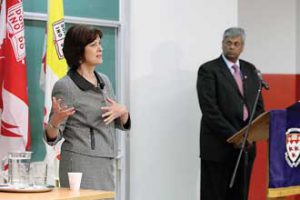
By Neale McDevitt
While many people were soaking up the lunchtime sun on March 9, Principal Heather Munroe-Blum fielded questions at Town Hall that ranged from tuition to infrastructure constraints.
The Principal greeted the audience gathered in the auditorium of Macdonald Campus’s Raymond Building by praising the host campus, calling it “exciting… the extent to which [you] both draw on the traditional historical strengths of Macdonald and have now taken areas… and grown them into very contemporary, very important fields of teaching, professional development, research, and technological and product development.
“You bring great strength to us,” Munroe-Blum continued. “The fact that you work in such an interdisciplinary context… offers a model for how the University as a whole might be moving… more to practical experience for undergraduate students.”
As in previous editions of Town Hall, the issue of money was quickly raised. Asked about the possibility of raising tuition, the Principal discussed the contentious issue of tuition hikes for the Desautels Faculty of Management MBA program.
“The big issue over the past six months has been the decision by the Board of Governors to move to a self-funding model for the MBA program,” she said. “We’re doing it because the cost of the MBA program per student currently… is $22,000 a year. We get a grant of $10,000 from the Government of Quebec for each one of those students and we get roughly $2,000 in tuition and fees from each student. We have a gap of $10,000 per student.”
The Principal said that without raising tuition for the MBA program, the deficit would continue to be shouldered by undergraduate students – an untenable situation. “To have undergraduate students, with their limited resources, subsidizing [the MBA program] made no sense.”
In talking about tuition in general, the Principal seemed happy with the “change in zeitgeist in Quebec” that has seen growing support for the tuition framework that McGill has been proposing for many years. The bottom line dictates that for McGill to retain its position among the world’s top universities, it must increase its revenues.
“We do rank as the No.1 public university in North America and No.18 amongst all universities in the world. But it is at a cost when you’re under-funded as we are. In our goal to both continue to grow our support for excellence, but also to grow our support for accessibility, we need more revenues coming in from sources other than government,” Munroe-Blum said.
When asked how close McGill was to balancing its budget, Munroe-Blum acknowledged that the current environment makes it a very tall order to fill. “When I came to McGill in 2003, Quebec was the No. 1 government-per-student-sponsor of universities in the country,” she said. “[But] we still had a gap of $350 million in 2003 between the Quebec system and the rest of Canada… Government funding was the absolute highest. [Today] government funding in Quebec… has dropped to No. 4 or 5 on a per-student basis [compared to the rest of Canada]. So it’s just not a sustainable model. Degree-completion rates suffer and participation in universities suffer, quality suffers, services for students suffer – we simply can’t continue like this.”
Moving from big-picture finances the questioning became more specific, as Munroe-Blum was asked why students doing research graduate degrees were more likely to win scholarships than their non-research counterparts. “We wish…it wasn’t a matter of picking and choosing,” she said. “But again it goes back to the matter of financing. There is no question from a scholarship point of view that those doing research graduate degrees get priority over those doing a non-research master degrees.”
Several participants broached the subject of student space at Mac, asking what plans were in place to adequately accommodate the ever-growing student body of McGill’s West Island campus.
Noting that space is a “huge issue” for the University as a whole, Munroe-Blum cited the extensive 2006 refurbishing of the Mac Campus Library as an example of how the University is trying to maximize efficiency of its existing space.
“In terms of space norms and students-per-square-foot, which is the way the Ministry calculates the space we’re entitled to, Macdonald Campus isn’t in bad shape,” the Principal said. “Mac is quite space-intensive in its research side as well. [We’re] trying to get a formula with the government which accommodates the need for space for students and professors and learning [as well as] the need for research space.”
